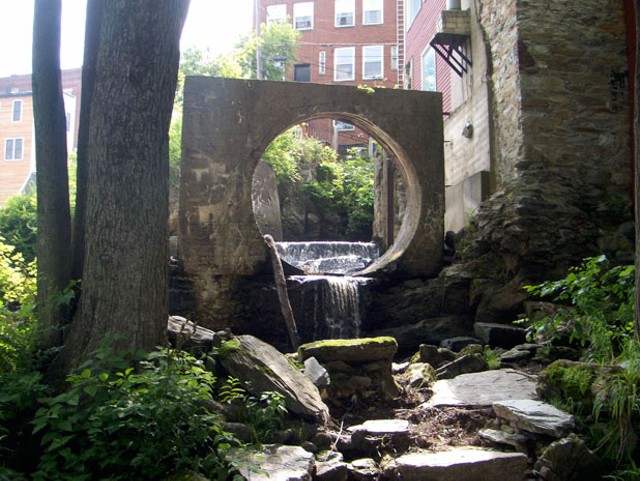Published September 17, 2008 at 5:42 a.m.
In the late 1990s, Anders Holm came up with what he thought was a pretty good idea: converting the energy generated by Middlebury's Otter Creek Falls into hydroelectric power.
Holm recalls that, as he began to craft his hydro-powered vision, the developers of Winooski One Hydroelectric Project, which was approved by regulators in 1988, warned him about complications associated with the Agency of Natural Resources' permitting process.
But he decided to try anyway, and in 2006, he began working with the state agency to get his project permitted.
He had no idea at the time that some 20 "small hydro" developers were in line behind him. Since 1988, not a single one of those projects has gotten the green light from ANR.
Holms, who has the support of Lt. Governor Brian Dubie and a conditional $250,000 grant from the Department of Public Service, describes ANR's permitting process as "ambiguous."
"It's like the hazing process in college," he said. "You're put through ridiculous tasks without a clear goal."
According to the U.S. Department of Energy, Vermont has 1200 sites that have the potential to produce hydroelectric power. Three quarters of those sites would fit the federal definition of "micro hydropower," meaning they would generate less than 100 kilowatts of electricity.
But despite that wealth of potential renewable energy, the ANR has no clear set of permitting guidelines for small hydro developers, according to Holm and other advocates. They say the absence of a clear application process creates long delays and bureaucratic confusion while imposing a financial burden on hydro developers, often forcing them to abandon the process.
Jim Hand is a prospective small hydro developer exasperated by ANR protocol. Though a self-described "neophyte" on policy matters, the Manchester car salesman imagined two-and-a-half years ago that it would be "easy" to get approval for his small hydro project. After all, the dam he had in mind had generated power as far back as the 1890s, and he figured the project wouldn't cause major aesthetic or ecological problems.
But despite some "helpful" feedback from ANR, Hand reports, his project remains mired in a "morass of legalese."
"I just want you to tell me: If I apply for a permit, what is the form I have to fill out, and what is the information I should provide? I don't think that's too much to ask," Hand suggests.
Catherine Gjessing of the ANR's Legal Division said the suggestion that hydroelectric developers find it hard to get projects approved is misleading. Of the 70-some proposals for hydroelectric projects that ANR received in the late 1970s and early 1980s, she said, 41 were built.
As for the complexity of the process, ANR recommended in January that a "comprehensive guide" to developing small hydropower be created. However, Gjessing pointed out, the Legislature didn't approve the $25,000 to $30,000 to fund it.
Moreover, Vermont's hydroelectric facilities are subject to state laws that protect watersheds, as well as federal oversight by the U.S. Fish and Wildlife Service and the Federal Energy Regulatory Commission, which licenses hydropower projects approved by states.
"I don't know that we have, or that we will ever have, control over the FERC application without federal legislation," Gjessing said. "Can we provide people with some guidance as to what information we need? . . . Yes. Are we willing to do that? Sure. Are we being asked to do more with less? All the time."
At least two hydropower advocates lay some blame for the complex process on Rep. David Deen (D-Putney), the chairman of the House Fish, Wildlife & Natural Resources Committee. Last year, hydropower advocates like Anders Holm asked the lawmakers to add language to S.209, a comprehensive energy bill, that would have streamlined the permit process.
As a "river steward" for the Connecticut River Watershed Council, a Massachusetts-based environmental advocacy group, Deen admits that he has spent "a good part of the last 10 years working to remove dams." Deen opposed some parts of S.209, but said he was just doing his part to keep tabs on the small hydro "industry."
Indeed, he added, the process of seeking permission to build on Vermont streams is supposed to be stringent.
"When you are using a public trust resource that belongs to all people of the state, and you are putting at risk the aquatic habitat in that public resource," Deen said, "you have a responsibility to go through a rigorous review process."
On September 10, hydro advocates and other stakeholders wrapped up a series of meetings at the Montpelier offices of the state's Natural Resources Board. The meetings, mandated by S. 209, were supposed to generate recommendations to amend the process of reviewing the impact of small hydro projects. Mark Lucas, associate general counsel for the NRB, said the consensus that emerged from the meetings was that some rule changes are "appropriate," involving, for example, issues such as stream flow.
Lt. Gov Brian Dubie, who is coordinating talks between Anders Holm and ANR Secretary George Crombie, remains hopeful that Vermont's hydroelectric resources can be tapped in a way that satisfies developers, regulators and stream advocates alike.
"It's gonna take us a while," Dubie said, "and $120-a-barrel fuel prices are a good motivator for us to protect the environment while developing an asset that's currently underutilized."
More By This Author
Speaking of...
-

Richmond Vows to Return to 'Full Fluoride' Levels
Oct 3, 2022 -

Richmond Learns a Town Official Lowered the Fluoride Level in Its Water for Years
Sep 28, 2022 -

Burlington Food Businesses Take a Hit with Weekend Water Issues
Feb 17, 2020 -

Lawmakers Question State's Approach to Parking Lot Runoff
Jan 17, 2018 -

A Rutland Nonprofit Purifies Water in Haiti and Honduras
Nov 23, 2016 - More »
Comments
Comments are closed.
From 2014-2020, Seven Days allowed readers to comment on all stories posted on our website. While we've appreciated the suggestions and insights, right now Seven Days is prioritizing our core mission — producing high-quality, responsible local journalism — over moderating online debates between readers.
To criticize, correct or praise our reporting, please send us a letter to the editor or send us a tip. We’ll check it out and report the results.
Online comments may return when we have better tech tools for managing them. Thanks for reading.













































